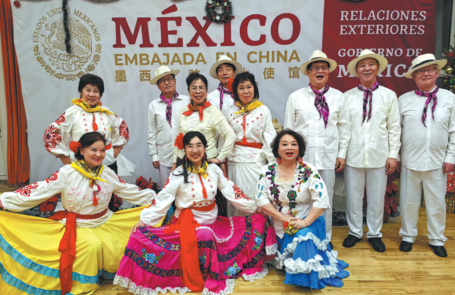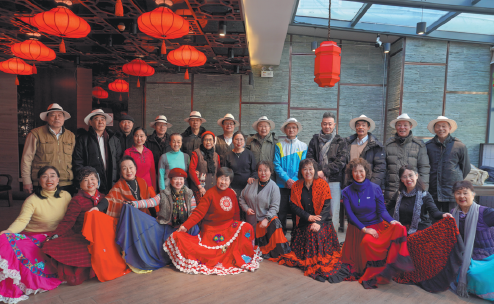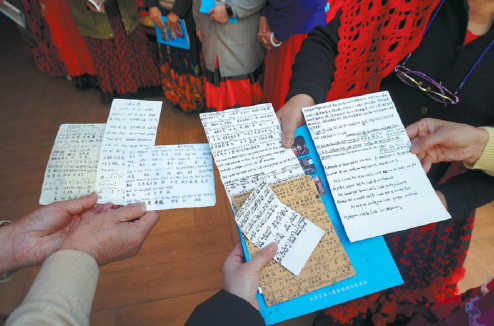Singing their way to solidarity

Beijing's only Latin America-inspired choir revels in the power that music has to unite hearts and minds, Mo Jingxi reports.
Every Monday morning, as commuters go to work and children go to school, a group of elderly people gather at a small community hall in Beijing's Dongcheng district. With an average age of 71, they are no longer just someone's grandparents or spouses, but proud members of the Friends of Latin America choir.
Established in 2018, the choir stands out as the only one of the hundreds of choirs in the capital that performs in Chinese, Spanish and Portuguese. With 40-plus members — the eldest being 82 — their journey has been one of passion and dedication.
"We were initially started by former Chinese diplomats who had worked in Latin American countries, journalists, and Spanish teachers. Now, most of our members have never studied Spanish, and are learning the language from scratch," says Yang Mingjiang, founder and head of the choir.
Last month, they were invited to perform El Condor Pasa (The Condor Passes), a song composed by Daniel Alomia Robles that is based on a traditional Andean folk song, at an event hosted by the Peruvian embassy in Beijing. The choir's vibrancy and colorful Andean tribute costumes won applause from the audience.
The choir is not funded, and the annual membership fee has been 100 yuan ($13.78) since it was set up, so they make most of their costumes themselves.
For example, the vests the men wore for the performance were actually a Chinese ethnic group costume, and the women's floral blouses were simple white shirts with different floral patterns they bought online and sewed themselves.
"The men's black hats originally only had a red feather, but to infuse them with more Peruvian flair, we added colorful pom-poms," Yang says.
A greater challenge, however, is the language.
Chen Xiaoming is one of the few original members of the choir. The 79-year-old was one of Yang's middle school classmates. "I joined the choir to support her," he says.
Chen had never studied Spanish before. After learning for several years, he cannot only sing songs, but also hold conversations.
To learn the song lyrics, he wrote the notes and words onto cardboard sheets so that he could practice anytime, anywhere. "At first, my grandson thought it would be a disaster for the choir if I was the lead singer, but now he's proud of me and says his grandpa is quite good," Chen says.
Other members use Chinese characters to grasp the Spanish pronunciation more quickly, but Yang does not recommend this approach, because in her view, it is not "professional".
Grabbing free moments as they wait for the bus, walk the dog, or take care of grandchildren, members have learned to sing more than a dozen songs. They attribute this achievement to Yang.
The 78-year-old graduated with a bachelor's degree in Spanish from the Beijing Foreign Studies University and earned her master's degree from Peking University. Before retiring, she worked in the Ministry of Culture on cultural exchanges and cooperation, and visited Latin America eight times, traveling to most of its countries.
Yang describes herself as "dedicated to spreading Spanish, and Spanish-language songs". In 1988, she translated a play she had seen in Mexico, Bellas Imagenes Sociales (Beautiful Social Images), and after some persistence, was able to stage it in China.
Yang single-handedly translates, arranges, and choreographs the songs, because not all of them have existing sheet music, and some require her to transcribe the melody and lyrics line by line. Now they have been compiled into a thick songbook.
"I am just an ordinary music lover. I've had to learn the accordion, the piano, composition, and arranging on my own. But I am willing to do my part to help the choir grow and through these songs that reflect the friendliness, openness, warmth, and passion of Latin American countries, inspire more Chinese," Yang says.
Chen says one reason he follows Yang is her professionalism. "If you want to sing a song, the pronunciation must be accurate; otherwise, neither Chinese nor foreigners will understand," he says.
Li Shanlin has been part of the choir for over a year. "I really appreciate Yang's arrangements. But I'm almost 70 years old and my memory is declining, so I think about quitting. However, Yang has refused to let me, and even invited me to participate in the event organized by the Peruvian embassy. My wife also supports and encourages me to continue," the 68-year-old says.
The Friends of Latin America choir has participated in several events hosted by Latin American embassies in China, gaining recognition within the Spanish-speaking diplomatic community.
Pei Shu joined the choir after watching their performance at the Mexican embassy in Beijing last year.
"The Chinese and Latin Americans have similar experiences, such as resisting aggression and fighting for national independence," 66-year-old Pei says, adding that this is why songs like La Paloma (The Dove) and El Condor Pasa resonate with him.
But 68-year-old Luo Jian believes that singing is the least thing worth mentioning of all they have learned in the choir.
"I used to be a bit depressed, but I have totally recovered. I think that people, no matter how old they are, always have the ability to learn new things, even at 80. In this choir, we have learned to maintain an optimistic spirit and work together," she says.
Yang believes that although China and Latin America have enjoyed closer relations in recent years, exchanges and understanding could be improved.
During the nationally televised CCTV Spring Festival Gala this year, many people learned about El Condor Pasa for the first time through a performance by Chinese and Peruvian artists.
"This song has instantly brought the peoples of the two countries closer together," Yang says.
On sunny Saturdays, the choir often practices at a pavilion in Beijing's Ditan Park, a popular scenic spot for foreign tourists. Once, they encountered some Mexicans, who upon hearing their singing, were reluctant to leave.
"We immediately sang Cielito Lindo (Lovely Sweet One) and Besame Mucho (Kiss Me a Lot) for them. They said they were so touched to hear songs from their home country in China, and that the performance was so touching and heartfelt," Yang says.
In March 2019, several members of the choir and their friends traveled to Latin America, visiting Mexico, Cuba and Panama, where they communicated through songs.
Zhang Lingmin, the 74-year-old deputy head of the choir who doesn't speak Spanish, was on the trip.
"As we traveled, we sang. It's the songs that brought us closer to people. We feel we have made our own contribution to people-to-people exchanges," she says.
Liang Yunan is from Kunming in Yunnan province. The 71-year-old moved to Beijing to take care of her grandchild. As a former choir member, Liang felt fortunate to have found the choir, which she joined last summer.
"Spanish is not easy to learn, but the choir is like paradise for me. I love the passion and vibrancy of Latin American songs, they make me happy," she says.
Yang says the choir feels honored and proud to serve as the grassroots-level envoy for promoting exchanges between China and Latin America. "We are willing to continue doing this meaningful work," she adds.
Contact the writer at mojingxi@chinadaily.com.cn



























